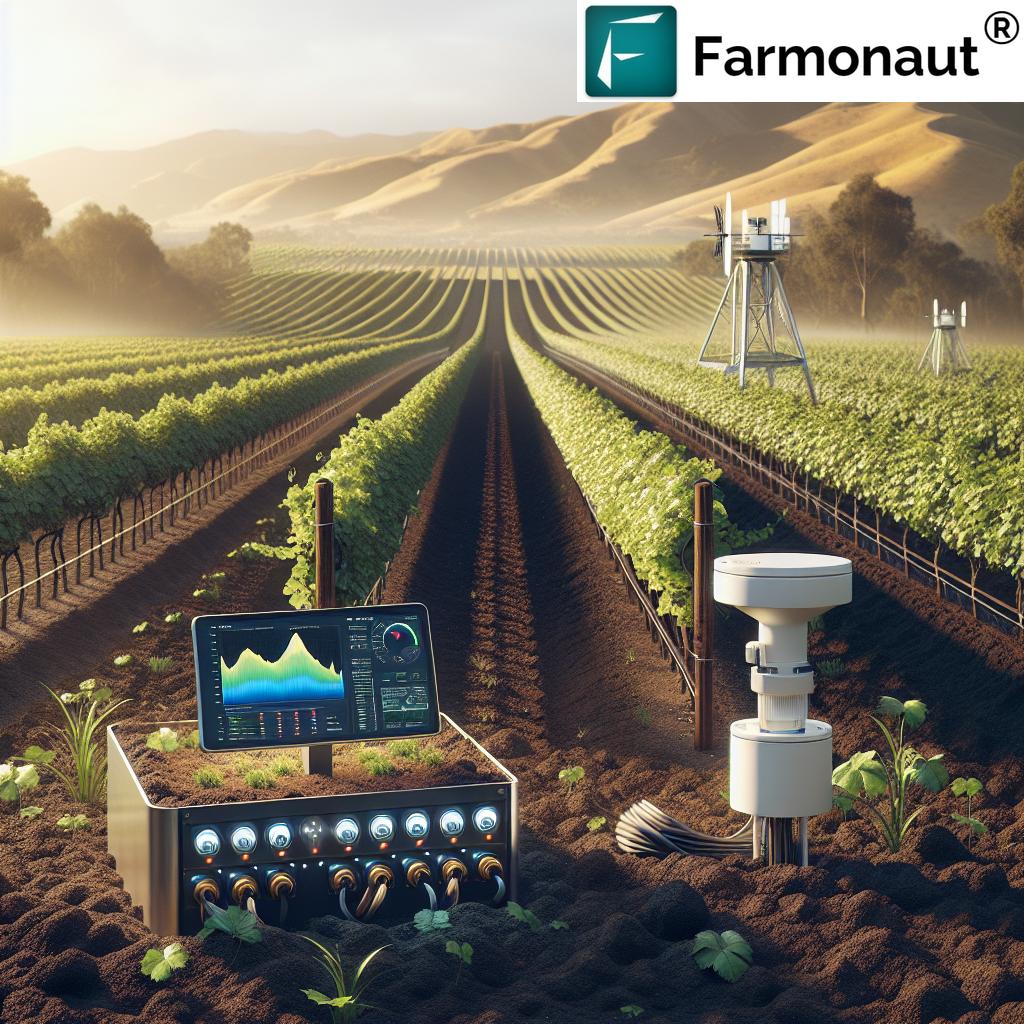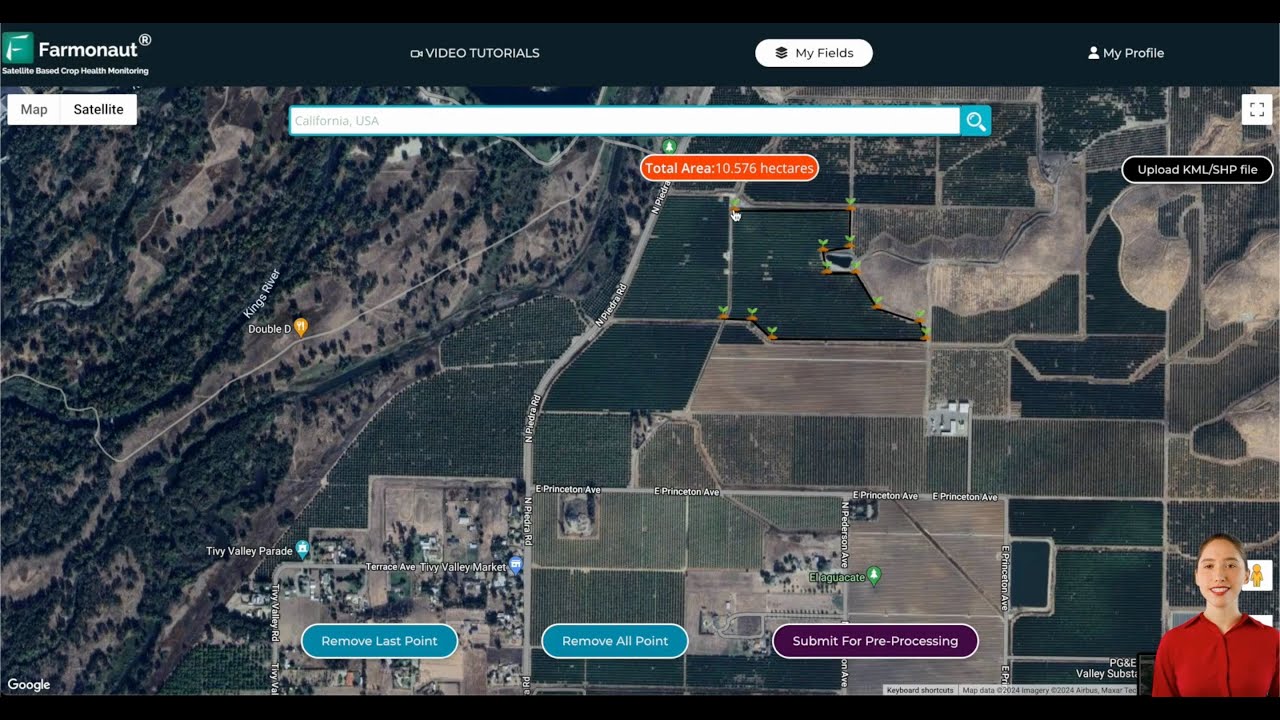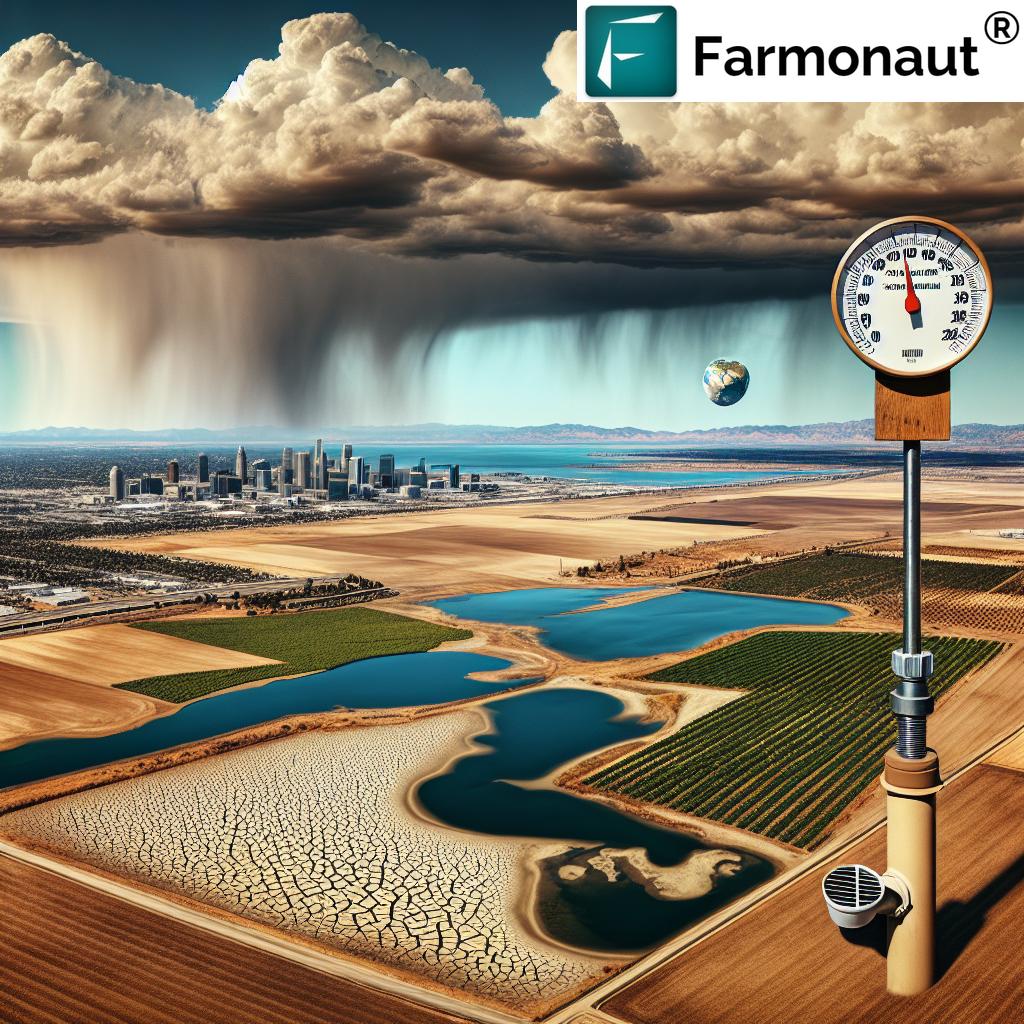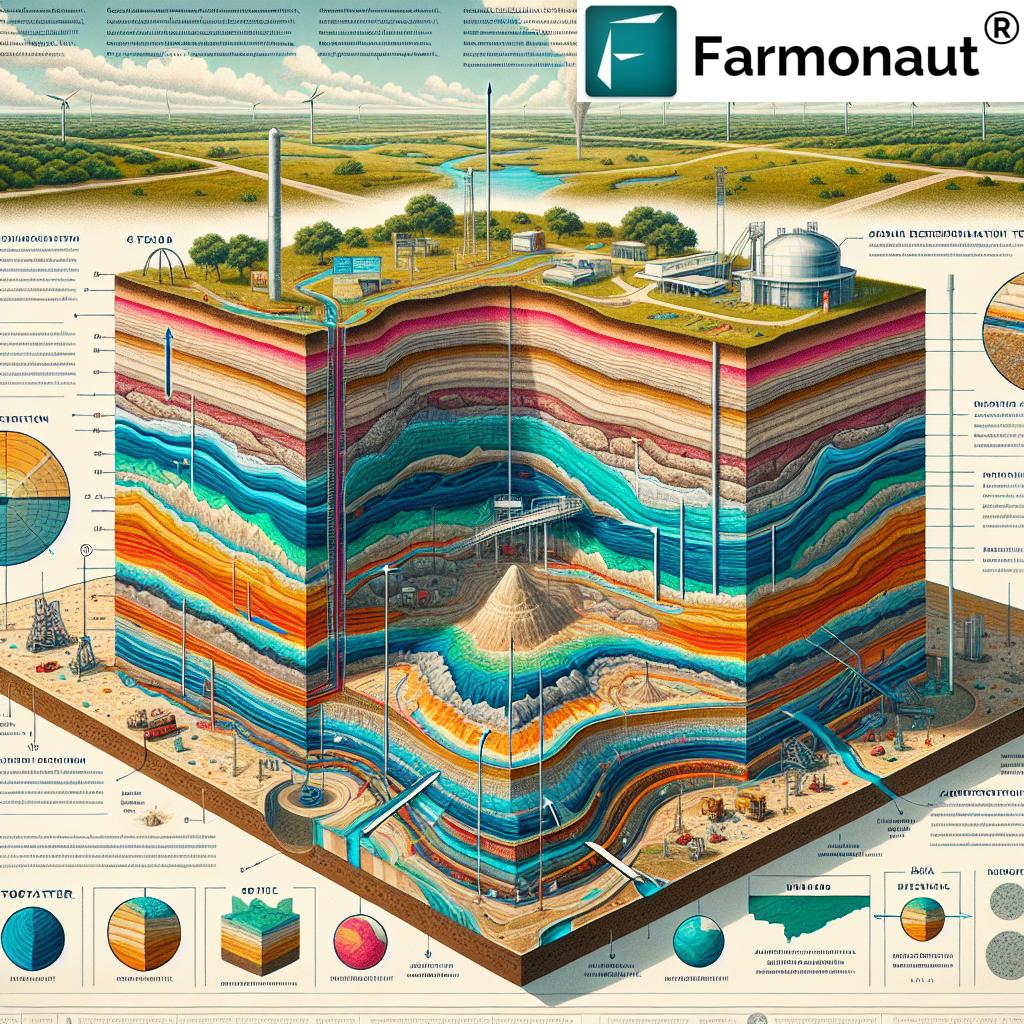Revolutionizing Agriculture: How New Federal Laws Impact Sustainable Farming Practices in California and Texas
“New federal laws aim to revolutionize sustainable agriculture in California and Texas, impacting over 47 million acres of farmland.”

In a groundbreaking move, recent federal laws and programs are set to transform the landscape of sustainable agriculture in the United States, with a particular focus on California and Texas. As we delve into this comprehensive legislative package, we’ll explore how these new initiatives address critical issues in agricultural land management, precision agriculture techniques, and environmental protection in farming.
At Farmonaut, we’re excited to see how these changes align with our mission to make precision agriculture accessible and affordable. Our satellite-based farm management solutions are perfectly positioned to help farmers adapt to and benefit from these new directives. Let’s explore the details of these transformative laws and their potential impact on sustainable farming practices.
The Legislative Landscape: A New Era for Sustainable Agriculture
On December 18, 2023, President Joe Biden signed a package of 50 bills into law, marking a significant shift in federal policy towards agriculture and environmental conservation. This extensive legislative effort reflects a bipartisan commitment to fostering a healthier, more informed, and empowered agricultural sector.
- Focus on water conservation in farming
- Enhancement of agricultural grant programs
- Promotion of smart farming solutions
- Support for soil health improvement
- Integration of agricultural drone technology
These laws represent a holistic approach to addressing the challenges faced by modern agriculture, particularly in states like California and Texas, which are at the forefront of agricultural production in the United States.
Impact on California’s Agricultural Sector
California, known as America’s fruit basket, stands to benefit significantly from these new federal laws. The state’s diverse agricultural landscape, ranging from the Central Valley to coastal regions, faces unique challenges that these laws aim to address.
Water Conservation and Management
One of the most critical aspects of the new legislation is its focus on water conservation. California, often plagued by drought conditions, will see increased support for:
- Advanced irrigation systems
- Groundwater recharge projects
- Precision water management techniques
These initiatives align perfectly with Farmonaut’s satellite-based crop monitoring systems, which provide real-time data on soil moisture levels, enabling farmers to optimize their water usage.
Sustainable Agriculture Technologies
The new laws also promote the adoption of sustainable agriculture technologies in California. This includes:
- Incentives for implementing precision agriculture techniques
- Support for adopting agricultural drone technology for crop monitoring and management
- Funding for research into climate-resistant crop varieties
Farmonaut’s AI-driven advisory system, Jeevn AI, complements these initiatives by providing personalized recommendations based on real-time data analysis.
Transforming Texas Agriculture
Texas, with its vast agricultural lands and diverse climate zones, faces unique challenges that the new federal laws aim to address. The Lone Star State is set to see significant changes in its farming practices.
Soil Health and Conservation
The legislation places a strong emphasis on soil health improvement, which is crucial for Texas’s varied soil types. Key initiatives include:
- Grants for implementing cover cropping and no-till farming
- Support for soil carbon sequestration projects
- Funding for research on soil microbiome enhancement
These efforts align with Farmonaut’s commitment to sustainable farming practices, as our satellite imagery can help monitor the impact of these conservation efforts over time.
Precision Agriculture and Smart Farming
Texas farmers will benefit from increased support for precision agriculture techniques and smart farming solutions. This includes:
- Subsidies for GPS-guided machinery and variable rate technology
- Funding for IoT sensors and farm management software
- Support for implementing big data analytics in farm operations
Farmonaut’s platform, which integrates satellite data with AI-driven insights, is well-positioned to help Texas farmers leverage these new technologies effectively.
“Recent legislation prioritizes soil health improvement, potentially affecting 90% of U.S. cropland vulnerable to erosion and degradation.”

Cross-State Initiatives and National Impact
While California and Texas are key beneficiaries, the new federal laws have a nationwide scope, fostering collaboration and knowledge sharing across state lines.
Agricultural Grant Programs
The legislation significantly enhances agricultural grant programs, providing:
- Increased funding for research institutions
- Grants for farmer-led innovation projects
- Support for young and beginning farmers
These programs aim to accelerate the adoption of sustainable practices and technologies across the country. Farmonaut supports these initiatives by offering affordable access to advanced farm management tools through our web application and mobile apps.
Environmental Protection in Farming
The new laws place a strong emphasis on environmental protection in farming, addressing issues such as:
- Reduction of agricultural runoff
- Promotion of biodiversity on farmlands
- Support for transitioning to organic farming practices
Farmonaut’s satellite-based monitoring can help farmers track their progress in implementing these environmental protection measures, ensuring compliance with new regulations.
Technological Advancements and Integration
The new federal laws recognize the critical role of technology in advancing sustainable agriculture. Key focus areas include:
Agricultural Drone Technology
The legislation provides significant support for the integration of agricultural drone technology into farming practices. This includes:
- Funding for drone pilot training programs
- Grants for purchasing advanced agricultural drones
- Support for developing AI-powered image analysis software
While Farmonaut primarily uses satellite imagery, our platform can integrate drone data to provide even more detailed insights into crop health and field conditions.
Crop Monitoring Systems
The new laws also emphasize the importance of advanced crop monitoring systems. Key initiatives include:
- Support for implementing IoT sensors in fields
- Funding for developing AI-driven crop health prediction models
- Grants for integrating weather data into farm management systems
Farmonaut’s platform aligns perfectly with these initiatives, offering real-time crop health monitoring through our satellite-based technology. Our API also allows for seamless integration with other farm management tools.
Economic Implications and Rural Development
The new federal laws go beyond just agricultural practices, aiming to bolster rural economies and ensure long-term sustainability of farming communities.
Support for Small and Medium-Sized Farms
The legislation includes specific provisions to support small and medium-sized farms, including:
- Low-interest loans for implementing sustainable technologies
- Grants for cooperative farming initiatives
- Support for farm-to-table and local food programs
Farmonaut’s affordable solutions are particularly beneficial for smaller farms looking to adopt precision agriculture techniques without significant upfront costs.
Workforce Development and Education
Recognizing the importance of a skilled agricultural workforce, the new laws provide:
- Funding for agricultural education programs in schools and colleges
- Support for vocational training in advanced farming techniques
- Grants for farmer-to-farmer mentorship programs
These initiatives align with Farmonaut’s mission to make precision agriculture accessible and understandable to all farmers, regardless of their technological background.
Comparative Analysis: California vs. Texas
While both California and Texas stand to benefit significantly from these new federal laws, the impact and implementation will vary due to their unique agricultural landscapes and challenges.
| Legislative Area | California Impact | Texas Impact |
|---|---|---|
| Water Conservation | Focus on drought-resistant technologies and water recycling | Emphasis on efficient irrigation systems and aquifer management |
| Soil Health Improvement | Support for organic farming practices and erosion control | Focus on soil carbon sequestration and no-till farming |
| Precision Agriculture Support | Funding for high-tech greenhouse systems and vertical farming | Support for GPS-guided machinery and variable rate technology |
| Drone Technology Integration | Focus on pest detection and crop health monitoring | Emphasis on large-scale field mapping and livestock management |
| Agricultural Grants | Priority for sustainable viticulture and specialty crop research | Focus on cotton and grain production efficiency |
| Research Funding | Emphasis on climate-resistant crop varieties | Focus on drought-tolerant livestock breeds and feed alternatives |
This comparative analysis highlights how the federal laws are tailored to address the specific needs and challenges of each state’s agricultural sector. Farmonaut’s versatile platform can adapt to these varied requirements, offering customized solutions for farmers in both California and Texas.
The Role of Technology in Implementing New Regulations
As these new federal laws come into effect, technology will play a crucial role in their implementation and success. Farmonaut’s suite of tools is well-positioned to help farmers adapt to these changes:
- Satellite-Based Monitoring: Our real-time crop health monitoring aligns with the new focus on precision agriculture and resource management.
- AI-Driven Advisory: Jeevn AI can help farmers make informed decisions in line with new sustainability requirements.
- Data Integration: Our platform can integrate various data sources, helping farmers comply with new reporting and monitoring regulations.
To explore how Farmonaut can help you leverage these new federal initiatives, check out our API Developer Docs for integration options.
Future Outlook and Challenges
While the new federal laws offer tremendous opportunities for advancing sustainable agriculture, there are also challenges to consider:
- Technology Adoption: Ensuring widespread adoption of new technologies, especially among smaller farms.
- Data Privacy: Balancing the need for data-driven agriculture with farmers’ privacy concerns.
- Climate Variability: Adapting sustainable practices to increasingly unpredictable weather patterns.
- Economic Transition: Managing the economic impacts as farms transition to more sustainable practices.
Farmonaut is committed to addressing these challenges by continually improving our platform and offering support to farmers as they navigate these changes.
Conclusion: A New Era for Sustainable Farming
The recent federal laws mark a significant shift towards more sustainable and technologically advanced farming practices in the United States. For farmers in California, Texas, and across the nation, these changes present both opportunities and challenges. By leveraging advanced technologies and embracing sustainable practices, farmers can not only comply with new regulations but also improve their productivity and profitability.
At Farmonaut, we’re excited to be part of this agricultural revolution. Our platform is designed to help farmers of all sizes harness the power of satellite technology and AI to optimize their operations and contribute to a more sustainable future for agriculture.
Ready to see how Farmonaut can help you adapt to these new federal initiatives? Download our app today:
FAQs
- How will these new federal laws affect small farmers?
The laws include specific provisions to support small and medium-sized farms, including grants and low-interest loans for adopting sustainable technologies. - What types of agricultural grant programs are available under the new legislation?
The new laws enhance various grant programs, including funding for research, farmer-led innovation projects, and support for young and beginning farmers. - How does the legislation address water conservation in farming?
The laws provide support for advanced irrigation systems, groundwater recharge projects, and precision water management techniques. - What role does agricultural drone technology play in the new regulations?
The legislation provides funding for drone pilot training, grants for purchasing agricultural drones, and support for developing AI-powered image analysis software. - How can farmers access the new technologies promoted by these laws?
Farmers can access these technologies through various means, including government grants, partnerships with tech companies like Farmonaut, and educational programs outlined in the legislation.



















